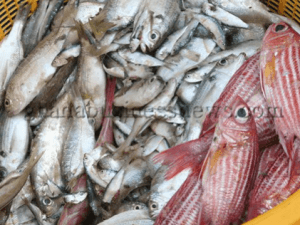High taxes and levies threaten fish importation – Association
 The Bulk Fish Importers Association of Ghana has stated that high taxes and levies are threatening fish importation to Ghana, a situation they said can lead to a fish shortage in Ghana.
The Bulk Fish Importers Association of Ghana has stated that high taxes and levies are threatening fish importation to Ghana, a situation they said can lead to a fish shortage in Ghana.
The Association, which is a member arm of the Importers and Exporters Association of Ghana (IEAG), has therefore urged the government to urgently address the numerous challenges facing fish importation to Ghana as there is a growing fear of a seeming fish shortage in the country.
In a statement signed by Mr. Samson Asaki Awingobit, Executive Secretary of IEAG, and copied to the Ghana News Agency in Tema stated that the Bulk Fish Importers Association Ghana and its members imported over 80 percent of Ghana’s total imported frozen fish.
They indicated that data showed that Ghana’s fish consumption constitutes more than 60 percent of its residents’ protein intake, with a per capita consumption of about 25 to 30kg.
They added that it was imperative to note that Ghana has a fish production deficit of over 60 percent, which has been largely augmented by fish imported into the system by the Association’s members.
They stated that the astronomical increment of the Fish Import Levy from GH¢15.00 to $17.25 (GH¢251) per metric tonne since January 2023, representing a 1,573 percent increment, was very alarming, especially when businesses across the world were struggling to even adapt to the global economic crises.
According to them, neither the views of the Association, its members, nor industry players were engaged during the increment process, questioning why the sudden change of the fish levy from cedi to dollars.
“The recent removal of the 30 percent benchmark value has also affected our import business, whereas the recent 2.5 percent VAT increment has become an albatross on our operations,” they stated.
The Association further stated that another worrying factor was the introduction of the recently accented three tax bills, which they said the government must reverse because they could have an adverse effect on the already struggling sector.
They explained that “with the introduction of these new taxes coupled with the already existing taxes, it means customs duty on imports in Ghana is currently pegged at 39.64 percent on CIF, plus $17.25 per tonne.
They explained that this duty figure as compared to neighbouring countries like the Ivory Coast, which pays 12.5 percent customs duty on CIF, Ghana is likely to see a further dip in traffic flow, which has been abysmal for the past several months.”
The Association expressed worry that apart from vessels preferring to discharge at Togo and Ivory Coast due to the high cost of doing business at Ghana’s ports, there had been an explosion in fish smuggling from neighbouring countries, especially Cote d’Ivoire and Burkina Faso, into Ghana.
This, they said, has also had a negative impact on their businesses as most of these smuggled fish being sold across the county were not taxed.
They said coupled with this is “the constant harassment by the Ghana Revenue Authority (GRA) and its staff, all in the name of revenue mobilization, whereas the GRA hasn’t created an enabling environment to boost our businesses.”
The statement indicated that their members, who were able to continue with the importation of fish, would not think twice about passing the cost they incur onto the consumer, which they acknowledged could spark price hikes in fish products across the country.
The Association noted that with the general knowledge that fish prices had increased internationally in costs and charges, making fish imports expensive, the ordinary Ghanaian will find it difficult to meet their protein requirement due to a fish shortage in the country if the government fails to put in place measures to address the situation.
They therefore urged the government to engage them when reviewing taxes, levies, VAT, and others because the importation business constitutes about 80 percent of the country’s revenue at the Port.
Source: GNA
